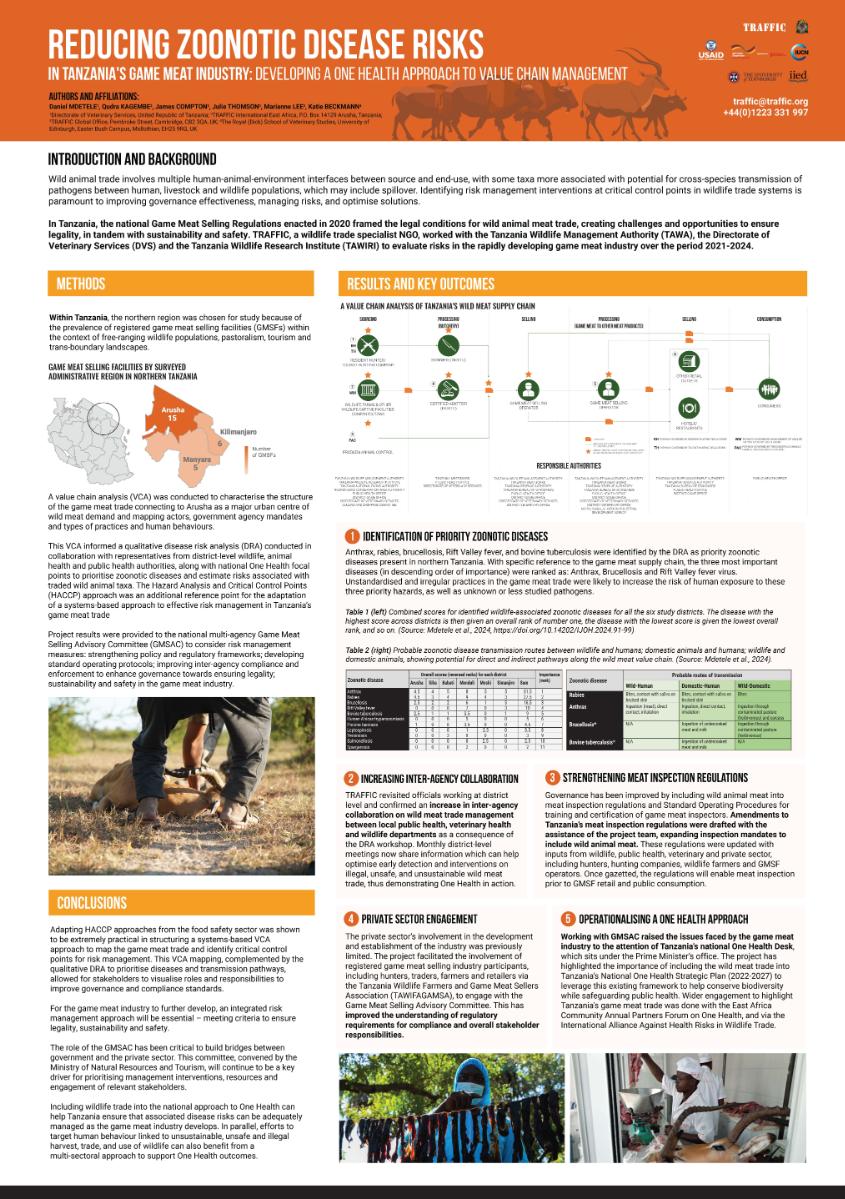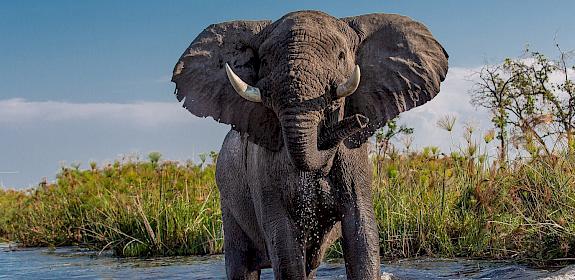How TRAFFIC has applied One Health approaches to wildlife trade challenges
World One Health Day arrived this year hot on the heels of the Convention on Biological Diversity agreeing a landmark Global Action Plan on Biodiversity and Health. TRAFFIC welcomes this global focus on the interconnectedness of ecosystems, animals and humans, reflecting on key achievements and learnings from the past four years of the USAID Wildlife TRAPS Project.
The project enabled global collaboration by TRAFFIC with IUCN and other partners on reducing disease risks from wildlife trade through operationalising the One Health approach. National engagement in Cameroon, China, Tanzania and Viet Nam focused on systems-based analyses across the use of wild meat as food, traditional medicine, pets and biomedical research to develop holistic risk management strategies.
This included adding zoonotic disease risk management to existing criteria assessing the legality and sustainability of trade by mobilising health agency expertise from animal, public and environmental health sectors to work with wildlife trade management agencies, including national One Health platforms.
TRAFFIC’s has shared its insights via multi-sectoral partnerships, including the Collaborative Partnership on Sustainable Wildlife Management (CPW) and the International Alliance Against Health Risks in Wildlife Trade, while contributing to global policy development through CITES inter-sessional work to reduce risks of future zoonotic disease emergence associated with international wildlife trade, and the CBD’s recently agreed Global Action Plan on Biodiversity and Health.
“One Health – an integrated, unifying approach that aims to sustainably balance and optimize the health of people, animals and ecosystems – is a big concept by definition,” said James Compton, TRAFFIC Senior Advisor for Wildlife Trade and One Health.
TRAFFIC has focused on making it as practical as possible when looking for solutions to wildlife trade risk management, using a One Health Approach TO BUILD bridges between sectors and professional expertise to engage relevant government agencies, private sector businesses and associations, including hunters, farmers, traders and civil society."
James Compton, TRAFFIC Senior Advisor for Wildlife Trade and One HealthTRAFFIC worked with the World Organization for Animal Health (WOAH) to develop the Guidelines for Addressing Disease Risks in Wildlife Trade, including piloting those Guidelines in Thailand and informing national focal points through WOAH’s Regional Wildlife Health Networks.

By characterising and visualising wildlife trade systems, TRAFFIC examined risks of zoonotic disease emergence and transmission in consultation with stakeholders. Understanding these systems, the stakeholders and governance structures proved fundamental to identifying critical control points for interventions. These include recommendations for improved inter-agency governance, regulatory compliance and enforcement, trade monitoring and disease risk surveillance, and social and behavioural change targeting high-risk practices at human-animal interfaces.
In Tanzania, TRAFFIC conducted a qualitative disease risk analysis (DRA) on the recently formalised game meat industry by engaging public health, veterinary health and wildlife management agencies from district level, together with national One Health focal points.
By identifying priority diseases (Anthrax, Brucellosis, Rift Valley Fever) together with a systems-based mapping of the game meat value chain, TRAFFIC was able to prioritise interventions to reduce disease risks, together with addressing legality and sustainability.
Insights and recommendations were channelled through the national Game Meat Selling Advisory Committee, an inter-agency body that frames a multi-sectoral response led by the Tanzanian Wildlife Management Authority (TAWA) together with the national One Health Desk, veterinary and public health agencies and private sector partners.
“In the short time since the Game Meat Selling Regulations were enacted in 2020, the legal game meat industry has developed rapidly. Through collaboration with Tanzanian government agencies TRAFFIC has identified where interventions need to be made towards making the game meat trade sustainable, safe and legal. There is still a way to go yet, but there is great potential for this to demonstrate how Target 5 of the Kunming-Montreal Global Biodiversity Framework can be met through following a One Health approach.“
About Wildlife TRAPS
The Wildlife TRAPS Project, implemented by TRAFFIC and IUCN with funding support from USAID, is helping to forge cross-sectoral partnerships with government and experts in inter-governmental organisations, NGOs, academia, and the private sector to identify risk mitigation strategies to prevent future zoonotic spillover potential associated with trade in wild animals.
As well as social and behavioural change interventions, the Wildlife TRAPS project is supporting policy and regulatory reform efforts, including strengthening supply chain management systems. The identification of critical control points within wildlife trade supply chains will help target illicit and other high-risk wildlife trade practices that may facilitate the transmission of zoonotic diseases.





